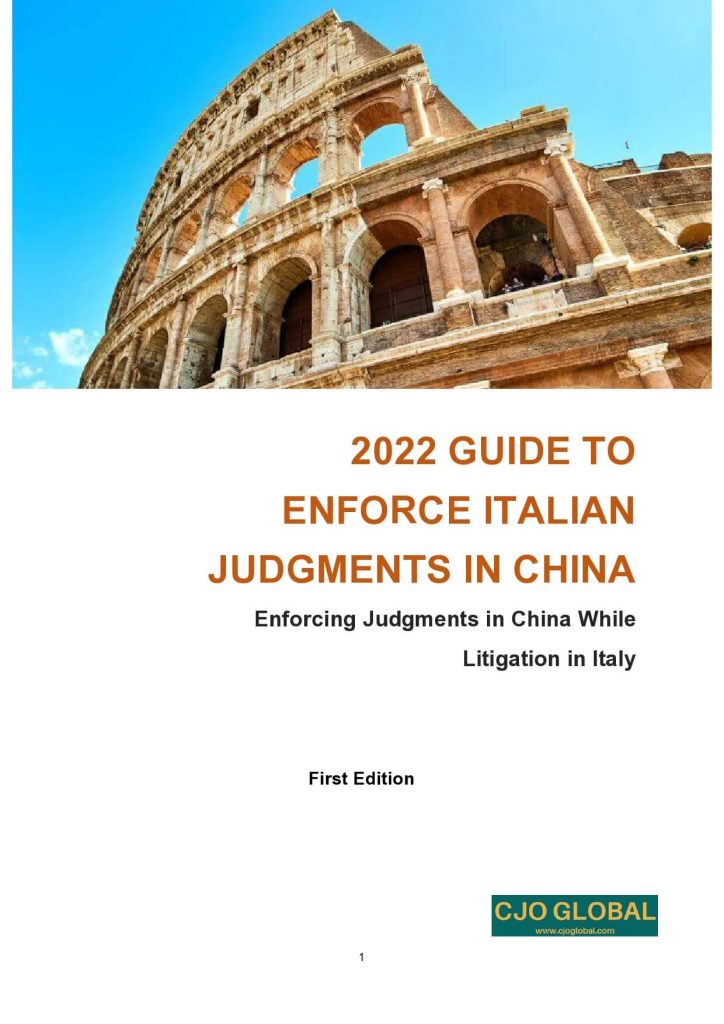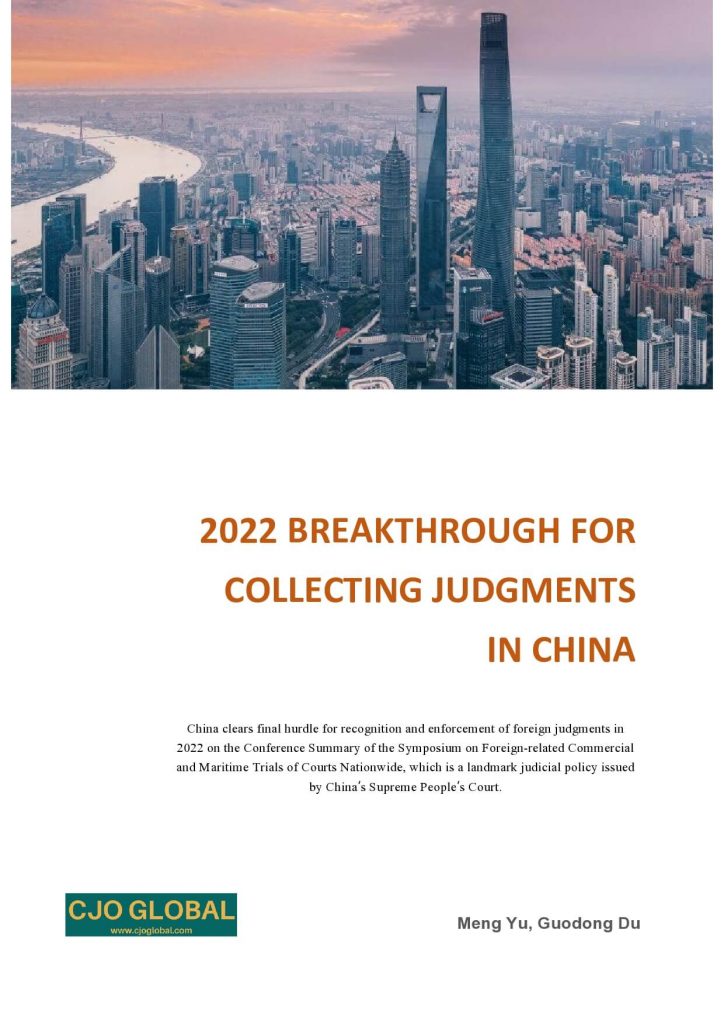Can Judgment Creditor’s Successor Apply for Enforcing Foreign Judgments in China?
Key takeaways:
- In Ye Aiwen v. Chen Tihu (2019) Zhe 03 Xie Wai Xi Ren No.18, the Chinese court in Wenzhou, Zhejiang Province, enforced an Italian judgment in March 2021, upholding the claim of the judgment creditor’s successor.
- It is clear that a successor to the judgment creditor can be an applicant for recognition and enforcement of judgments in China. However, whether the succession administrator can act as the applicant still remains uncertain.
Related Guides to Enforce Foreign Judgments in China:
Can the successor to the judgment creditor apply to a Chinese court for recognition and enforcement of an Italian judgment?
Yes. In a recent case Ye Aiwen v. Chen Tihu (2019) Zhe 03 Xie Wai Xi Ren No.18 ((2019)浙03协外认18号), the Chinese court upheld the claim.
To our knowledge, it is the first known case in China, where the successor to the deceased judgment creditor filed the case, as the applicant, for recognition and enforcement of a foreign judgment.
On 31 Mar. 2021, Wenzhou Intermediate People’s Court in Zhejiang Province (the “Wenzhou Court”) rendered the civil ruling “(2019) Zhe 03 Xie Wai Xi Ren No.18”, recognizing the judgment (Case No. 7343/08) (the “Italian Judgment”) made by the Court of Brescia of the Italian Republic (the “Brescia Court”) on 15 June 2011.
The applicant in the case is the wife of the judgment creditor in the Italian Judgment, i.e. his legal successor.
This case indicates that the successor to a judgment creditor can be an applicant for recognition and enforcement of judgments in China. However, whether the succession administrator can act as the applicant still remains uncertain.
I. Case overview
In that case, the Italian Judgment creditor is Mr. Hu Lijiao (“Hu”) and the defendant is a Chinese citizen named Chen Tihu (“Chen”).
The applicant is Ye Aiwen (“Ye”), a Chinese citizen and the wife of Hu.
Hu filed a lawsuit against Chen in the Brescia Court, which ruled in Hu’s favor. Thereafter, Hu, the judgment creditor died.
After Hu’s death, his wife Ye, as his legal successor, applied to the Wenzhou Court for recognition and enforcement of the Italian Judgment on 19 Sept. 2019.
The Wenzhou Court ruled on 31 Mar. 2021 to recognize and enforce the Italian Judgment.
II. Case facts
Ye and Hu registered their marriage on 5 Sept. 2000 in Bergamo, Italy.
In 2005, Hu and the defendant Chen (also the respondent in the case of recognition and enforcement of the Italian Judgment) concluded a store sublease contract in Brescia, Italy. Thereafter, Hu and the defendant had disputes over the sublease contract.
In 2008, Hu initiated an action against Chen in the Brescia Court.
On 15 Jun. 2011, the Brescia Court rendered the judgment “No. 7343/08”, ordering the defendant to pay Hu an amount of EUR 31,300 and relevant interests.
After the judgment was rendered, neither party appealed. However, the defendant Chen has not yet performed the judgment to make the payment.
On 21 Aug. 2017, Hu died in Trenzano, Italy.
On 19 Sept. 2019, as Hu’s wife and legal successor, Ye applied to the Wenzhou Court for recognition and enforcement of the Italian Judgment.
The Wenzhou Court issued a subpoena to the respondent, but Chen did not appear in court to participate in the litigation.
On 31 Mar. 2021, the Wenzhou Court rendered the civil ruling, “(2019) Zhe 03 Xie Wai Xi Ren No.18”, to recognize and enforce the Italian Judgment.
III. Court views
The Wenzhou Court held that:
Firstly, after the death of Hu, the judgment creditor, Ye shall, as Hu’s successor, have the right to apply for recognition and enforcement of the Italian judgment.
Secondly, China and Italy concluded the Treaty on Judicial Assistance in Civil Matters between the People’s Republic of China and the Italian Republic (中华人民共和国和意大利共和国关于民事司法协助的条约, hereafter ‘the Treaty’). After examining the applicant’s claim in accordance with the Treaty, the Wenzhou court held that there existed no justifiable ground for refusal to recognize or enforce the foreign judgment.
Accordingly, the Wenzhou Court recognized and enforced the Italian Judgment.
IV. Our comments
Why can the successor to the judgment creditor be the applicant in this case? The Wenzhou court did not explain the reasons in its ruling, concluding only that “Ye Aiwen, as the successor to the judgment creditor, shall have the right to apply for recognition and enforcement of the Italian Judgment”.
In our opinion, one of the key issues of this case lies in whether the successor to the judgment creditor has the standing to apply for recognition and enforcement of the foreign judgment in this case.
This not only involves provisions relating to the plaintiff (applicant) in the Civil Procedure Law (CPL) of the People’s Republic of China, but also involves the determination of foreign-related inheritance relationship (or marital property relationship), that is, by determining the applicable law through China’s conflict rules and accordingly judging whether the applicant has a direct interest in the case and is thus entitled to litigation benefits on grounds of the valid inheritance relationship (or marital property relationship).
A similar judicial opinion can be found in Huang Yiming, Su Yuedi v. Chow Tai Fook Nominee Ltd. et al. (2015) Min Si Zhong Zi No. 9 ((2015)民四终字第9号), adjudicated by China’s Supreme People’s Court (SPC). According to the SPC’s opinion, whether the plaintiff has the standing to sue is a procedural matter, which is governed by the lex fori, i.e. the Chinese Civil Procedure Law (CPL). Pursuant to Article 119 of the CPL, a plaintiff must be a citizen, legal person or other organization that has a direct interest in the case. Therefore, how to determine the “direct interest” is crucial. In Huang Yiming, Su Yuedi v. Chow Tai Fook Nominee Ltd. et. al., the SPC determined the Chinese law as the governing laws for inheritance and matrimonial property relations, by applying pertinent conflict rules (Articles 24 and 31 of the Law of the People’s Republic of China on Application of the Law in Foreign-Related Civil Relations (中华人民共和国涉外民事关系法律适用法)), and accordingly ruled that the two plaintiffs (the son and the wife of the deceased), respectively as the property inheritor and co-owner of the marital property, had direct interest and thus had the standing to sue.
We believe that although the court reasoning in this case is very brief, its significance should not be underestimated. This case confirms that the successors to judgment creditor can apply to Chinese courts for recognition and enforcement of foreign judgments as applicants.
However, it is still unclear whether the succession administrator can be the applicant. Considering that the administrator is not the successor nor the right holder, but the person responsible for the proper preservation, management and distribution of the deceased’s property, it is yet to be tested whether he/she has direct interest. We look forward to seeing more cases in response to this.
Do you need support in cross-border trade and debt collection? CJO Global's team can provide you with China-related cross-border trade risk management and debt collection services, including: (1) Trade Dispute Resolution (2) Debt Collection (3) Judgments and Awards Collection (4) Anti-Counterfeiting & IP Protection (5) Company Verification and Due Diligence (6) Trade Contract Drafting and Review If you need our services, or if you wish to share your story, you can contact our Client Manager: Susan Li (susan.li@yuanddu.com). If you want to know more about CJO Global, please click here. If you want to know more about CJO Global services, please click here. If you wish to read more CJO Global posts, please click here.










